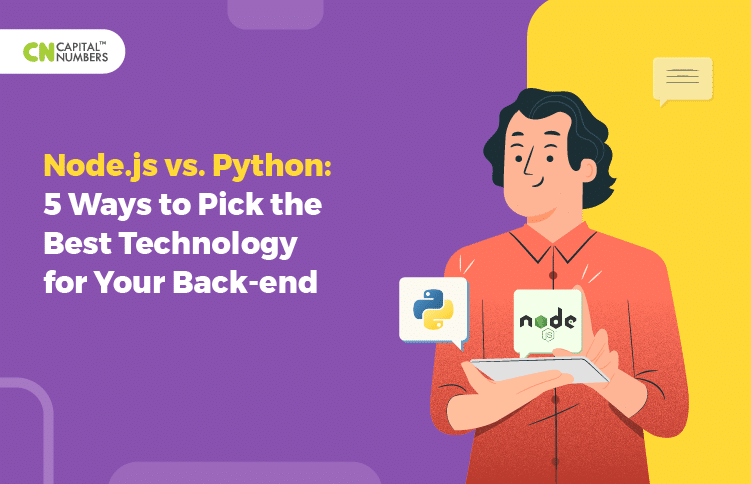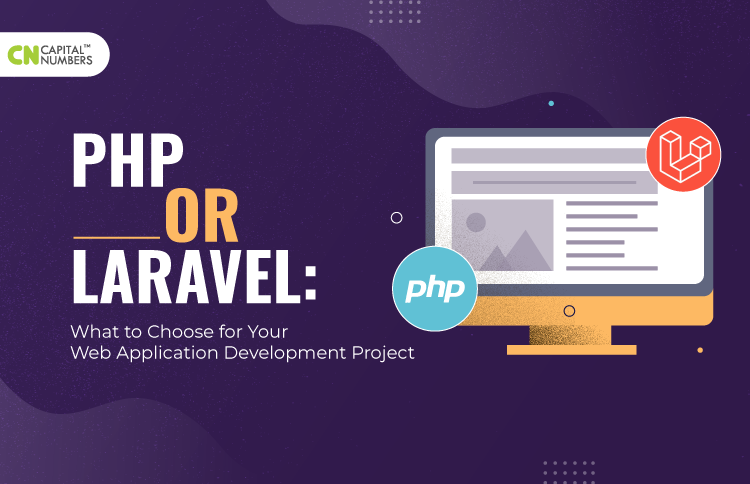Node.js vs. Python: 5 Ways to Pick the Best Technology for Your Back-end
Table of Contents
An application’s server-side or back-end is the engine that makes your app run. However responsive your app’s front-end is, it will fall flat on its face without a robust back-end to hold it up.
The programming language you choose to build it with determines various crucial flows and procedures in project development. So, it is essential to make the right choice. But with many technologies out there, the choice is not simple.
Node.js and Python are some of the most popular choices for back-end development. Both have vital package ecosystems and communities, and choosing between the two is difficult.
Confused between Python and Node.js development? To help you, here, we have compared both the back-end technologies. Let’s explore this in detail.
Performance Evaluation of Node.js and Python
1. Nodejs vs. Python: Performance and Speed
High performance and speed are the primary features of web and mobile apps. No matter the type of app you’ve decided to create, these two factors can make or break the product.
Node.js
- With the help of non-blocking, event-driven architecture, Node.js can process several requests simultaneously and speed up code execution. If you’re looking to enhance the performance of your web or mobile app, hiring Node.js developers can be the right choice.
- Between Node.js and Python performance, Node.js allows you to code outside the web browser using TCP sockets, making it more resource-efficient.
- Node.js development enables caching of fetched data that is unlikely to change. It causes higher speed than Python web development.
- As you can run JavaScript code on the Google-invested v8 engine, Node.js apps’ performance and responsiveness are remarkable.
Python
- Python uses a single code flow. So it can process requests comparatively slowly.
- Python has an innate architecture that restricts it from multithreading.
- Python can be a major letdown if you want a quick data recall from the server.
- Also, it’s not ideal if you prioritize performance and speed in your app with complex calculations.
So, here, Python is the winner.
2. Node.js vs. Python: Scalability
Scalability defines the linear growth of resources required with an increase in app functionalities. It should not be an afterthought but a factor for choosing your back-end language right from the get-go.
Node.js
- Node.js frameworks facilitate multithreading via its asynchronous architecture, leading to easy scalability.
- Rather than a solid core like Python, Node.js uses a set of modules and microservices for its functionalities. So, scaling the app means the incorporation of a few modules.
- Node.js allows you to scale both vertically and horizontally.
- Node gives you more options in terms of typing. You can choose strongly-Typed TypeScript or weakly-typed JavaScript.
Python
-
- A significant drawback of Python is its use of the Global Interpreter Lock, which does not support multithreading. Though scalability can be increased with imported libraries, it can’t combat the innate scalability of Node.js.
- Python is dynamically-typed, meaning it’s not a better programming language for large-scale projects with increasing development needs.
- As the Python system grows, it becomes unnecessarily complex and difficult to maintain.
Node.js beats Python when it comes to scalability.
3. Node.js vs. Python: Universality
It means the number of different applications a programming language supports. It is difficult to judge which is “more universal,” Python or Node.js, as both have many use cases and can be helpful across multiple platforms.
Node.js
-
-
- Node.js is a JavaScript tool that allows you to craft front-end and back-end development with the same programming language. So, it is efficient in terms of resources.
- As it has cross-platform functionality, you can use the same desktop app on Windows OS and Mac. Linux.
- Node’js has many use cases – web apps, mobile apps, and cloud and IoT solutions.
-
Python
-
-
- Python is also universal, as you can use it for front-end and back-end development.
- It enables cross-platform usage. Mac and Linux come with pre-configured Python, but you must install a Python interpreter for Windows.
- Python would be the top choice for IoT and Natural language Processing, but not so much for Python mobile app development.
-
When you consider the universality between Node.js and Python, both go neck and neck.
Also Read: Vue.js vs. React.js: How to Choose the Right JavaScript Technology
4. Node.js vs. Python: Architecture
Architecture is another vital factor when picking up your back-end development technology. Generally, it is the standard approach to abide by the language or framework/environment.
Node.js
-
-
- Node.js is event-driven. Both its input and output are asynchronous, causing a fast development process. So, it is the ideal choice for web games and chatbots.
- It can process many requests simultaneously without blocking the thread and at an incredible speed.
-
Python
-
-
- As Python is synchronous, it is slow. So, you may not pick this language if your project is like a chatbot. But you can leverage the Python Asyncio library to run parallel processes.
- It is not event-driven. Also, you can make it event-driven using modules like CPython.
-
As Node.js is asynchronous, event-driven, and has non-blocking architecture, it scores higher than Python.
5. Node.js vs. Python: Extensibility
The more data structures, frameworks, and functions you can tack onto the base platform, the more robust the functionality is.
Node.js
Every day, a new framework or tool poops up with Node as a base. The most widely used ones are
-
-
- Babel – for front-end development
- Jasmine- for testing
- Log.io – for project management
-
Python
The great extensibility and many web development frameworks make Python an excellent choice for back-end development.
-
-
- Robot – for acceptance level testing
- Flask – for web development
- Web2py – for agile development of data-driven web apps
- Django – for back-end development
-
Both Node.js and Python perform well in extensibility.
Bottom Line
The issue will persist as both Node.js and Python are still going strong. Both are excellent choices for their use cases.
If you need a data-intensive project with less code, Node.js is the ideal choice. On the other hand, if you have a larger project with diverse integrations and calculations, Python’s clean code and syntax will be a lifesaver.
And whether you are looking for Node.js or Python development services, we at Capital Numbers will offer you unmatchable services. Our talent pool will satiate your needs and exceed your expectations to the next level. Want to discuss your project? Book a call today!


 Web Development
Web Development Cloud Engineering
Cloud Engineering Mobile App Development
Mobile App Development AI/ML/GenAI
AI/ML/GenAI E-commerce
E-commerce Software Development
Software Development UI/UX
UI/UX QA
QA Dedicated Teams
Dedicated Teams











